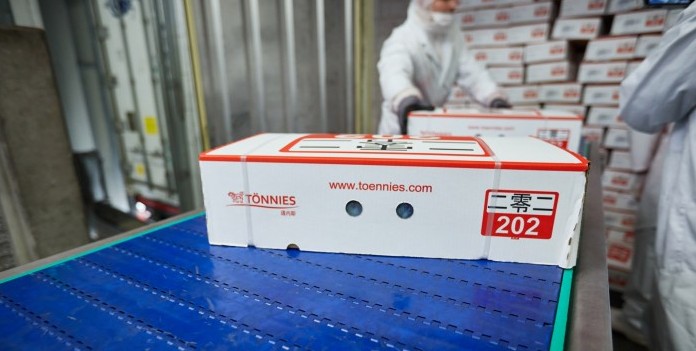The huge Tönnies pork processing plant in Germany is set to partially re-open, after being closed for around a month due to a major outbreak of COVID-19 among staff.
The authorities in Rheda-Wiedenbrück announced on Wednesday that the slaughter and blood processing parts of the plant can re-open, meaning 597 slaughter workers and 7 blood processing workers are now allowed to re-enter the premises. The work will be resumed ‘step by step’ and in compliance with amended and revised hygiene protocols, according to German pig industry organisation ISN.
A trial run is planned for Friday, when the hygiene regime and new installations at the plant, such as plexiglass screens to separate some working processes, will be inspected. The authorities said the slaughter and blood processing areas were ‘spatially and operationally separate from other areas of the group and are interdependent’, with a constant air exchange is guaranteed.
The plant accounts for up to 14% of German pork production and its closure in June after more than a quarter of its 6,000 employees tested positive for COVID-19, has had a massive impact in Germany and beyond.
ISN said the closure cost the industry €20 million (£18m) last week alone, with the ‘dramatic drop’ in the price of slaughter pigs of 19 cents since over the past fortnight creating ‘unbearable economic misery’ for farms.
The plant took a lot of cull sows from the UK and this market has been badly affected, with animals backing up on farm. “The cull sow market was extremely difficult, with minimal orders secured and pricing being a secondary concern. Culls are now backing up on farm, and there seems very little chance of early improvement,” TVC said in its latest market report.
ISN said the announcement was ‘an important signal for the entire pig market’. “However, this does not solve all the problems – it is important that the capacities are ramped up again quickly,” said ISN market expert Matthias Quaing.
“There are significant overhangs on the pig market that can only be reduced if Tönnies can slaughter and process significant quantities. It is also important that things move quickly now and that the snail’s pace of the past four weeks has not been repeated. A coordinated approach is important to prevent this from happening again.”
ISN managing director Dr Torsten Staack said there are now about 400,000 pigs in queue for slaughter, which corresponds to the amount of pigs slaughtered in around half a week in Germany.




